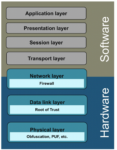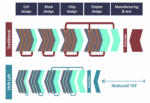In today’s rapidly advancing technological landscape, semiconductors are at the heart of innovation across diverse industries such as automotive, healthcare, telecommunications, and consumer electronics. As a leader in technology and engineering, Siemens plays a pivotal role in empowering the next generation … Read More
Design Stage Verification Gives a Boost for IP Designers
The concept of shift left is getting to be quite well-known. The strategy involves integrating various checks typically performed later in the design process into earlier stages. The main benefit is to catch and correct defects or errors at an earlier stage when it’s easier and faster to address. For complex SoC design, … Read More
Checking and Fixing Antenna Effects in IC Layouts
IC layouts go through extensive design rule checking to ensure correctness, before being accepted for fabrication at a foundry or IDM. There’s something called the antenna effect that happens during chip manufacturing where plasma-induced damage (PID) can lower the reliability of MOSFET devices. Layout designers run Design… Read More
Siemens Promotes Digital Threads for Electronic Systems Design
Many years ago, I remember discussions around islands of automation/silos. Within the scope of any given silo there is plenty of automation to handle tasks relevant to that phase. But managing the full lifecycle from concept through manufacturing to field support must cross between silos, and those transitions are not as clean… Read More
Designing for Security for Fully Autonomous Vehicles
With the advent of IoT devices, vehicles have become increasingly interconnected, offering enhanced automation, connectivity, electrification, and shared mobility. However, this progress also brings forth unprecedented challenges, particularly in ensuring the safety and security of automotive electronics. The complexity… Read More
INTERCHIP achieves 3x faster verification for next-gen clocking oscillator with advanced analog and mixed-signal EDA technology
Customer case studies have always been my favorite source of information. Press releases are a great start but there is always more to the story. Fortunately, I had the opportunity to speak with Sumit Vishwakarma, principal product manager at Siemens EDA about their recent press release with Interchip. I was an advisor to Berkeley… Read More
A Game-Changer for IP Designers: Design Stage Verification
In today’s rapidly evolving semiconductor industry, the design and integration of intellectual property (IP) play a pivotal role in achieving competitive advantage and market success. Whether sourced from commercial IP providers or developed in-house, ensuring that IP designs are compliant with signoff requirements… Read More
Soft checks are needed during Electrical Rule Checking of IC layouts
IC designs have physical verification applications like Layout Versus Schematic (LVS) at the transistor-level to ensure that layout and schematics are equivalent, in addition there’s an Electrical Rules Check (ERC) for connections to well regions called a soft check. The connections to all the devices needs to have the most… Read More
New Emulation, Enterprise Prototyping and FPGA-based Prototyping Launched
General purpose CPUs have run most EDA tools quite well for many years now, but if you really want to accelerate something like simulation then you start to look at using specializedhardware accelerators. . Emulators came onto the scene around 1986 and the processing power has greatly increased over the years, mostly in response… Read More
AI and SPICE Circuit Simulation Applications
Can you name the EDA vendor that first used AI starting 15 years ago for circuit designers using SPICE simulators? I can remember that vendor, it was Solido, now part of Siemens EDA, and I just read their 8 page paper on how they look at the various levels of AI being used in EDA to help IC designers work smarter and faster than using manual… Read More











